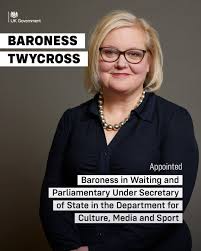The Big Conflation: How Bookmakers and Government Lump Casinos, Sports Betting, Slots, Lotteries, and Bingo into One Gilded Mess
It’s a neat bit of selective outrage. Crack down on the obvious villains—sports betting, slots, and bingo (yes, even bingo!)—while ignoring the state’s own gambling enterprise
Ed Grimshaw
11/27/20243 min read


The government’s £100m annual gambling levy is being trumpeted as a landmark reform. Yet, like most political gestures, it comes with gaping contradictions. At the centre of it all is Baroness Twycross, the gambling minister who’s leading the charge against betting shops, casinos, and online operators while seemingly turning a blind eye to the two fastest-growing sources of addictive behaviour in Britain: lotteries and crypto.
It’s a neat bit of selective outrage. Crack down on the obvious villains—sports betting, slots, and bingo (yes, even bingo!)—while ignoring the state’s own gambling enterprise and the unregulated chaos of cryptocurrency, which combines financial speculation with the allure of digital gold-rush wealth. The result? A policy that’s as incoherent as it is incomplete.
Baroness Twycross: A Roll of the Dice on Addiction
Baroness Twycross’s plan for a statutory levy is being sold as a bold step to tackle gambling-related harm. But while she lectures the industry on its moral failings, the government’s addiction to Lottery revenue remains unchallenged. Scratchcards and Lotto tickets, which exploit the same psychological hooks as other forms of gambling, escape criticism entirely.
Then there’s crypto—a digital casino masquerading as investment. With its promise of life-changing profits and a Wild West lack of oversight, cryptocurrency has created a new class of addicts, endlessly refreshing charts and buying the dip with money they don’t have. But you won’t hear much from Baroness Twycross about regulating crypto’s role in fuelling addiction, perhaps because it doesn’t fit the tidy narrative of “bad bookmakers” and “good causes.”
Lotteries: The State’s Favourite Vice
Let’s talk about the Lottery, which continues to operate as Britain’s most sanctimonious gambling empire. Scratchcards offer the same instant gratification and fast-paced play as online slots, but because the money is funnelled into art galleries and athletics tracks, we’re meant to pretend it’s all above board.
The addictive component of lotteries is undeniable. They sell hope to the hopeless, with odds so astronomically bad that you’re more likely to get struck by lightning while being attacked by a shark. Yet Baroness Twycross sees no issue with the government profiting handsomely from this form of gambling. It’s hard to take her moral stance seriously when she’s ignoring the giant scratchcard-shaped elephant in the room.
Crypto: The New Frontier of Addiction
Meanwhile, the rise of cryptocurrency has created an entirely new form of gambling, cloaked in the veneer of financial sophistication. Crypto markets operate 24/7, making them the equivalent of an endless roulette wheel. Investors—if we can even call them that—chase gains with the same compulsive energy as slot players pulling the lever. The volatility, the instant highs and crushing lows, the promise of a jackpot—all the hallmarks of gambling addiction are there.
And yet, there’s no crypto levy on the horizon, no parliamentary white paper wringing its hands over Bitcoin widows or NFT-fuelled bankruptcies. Crypto is ignored, left to thrive in its regulatory no man’s land while Baroness Twycross trains her sights on bingo halls and Ladbrokes.
The Convenient Blind Spot
The government’s selective morality is as transparent as it is self-serving. Private gambling operators are demonised, taxed, and lectured about their role in addiction, while state-run lotteries and the unregulated crypto world are given a free pass.
This hypocrisy isn’t just unfair—it’s counterproductive. The addictive mechanics of gambling are the same whether you’re pulling a lever on a slot machine, scratching a card, or refreshing your crypto portfolio. Speed, accessibility, and the illusion of control are the common denominators, yet the government only chooses to act against the most visible offenders.
A Rigged Game
Baroness Twycross is effectively gambling with addiction policy, betting that the public won’t notice the glaring inconsistencies in her approach. But the cracks are hard to miss. By focusing solely on bookmakers and casinos, she’s ignoring the growing problem areas that the Lottery and crypto represent.
The £100m levy may look good on paper, but it’s a half-baked solution to a complex problem. Until the government acknowledges its own complicity in promoting gambling through the Lottery—and takes a serious look at the addictive potential of crypto—its moral authority on gambling harms will remain paper-thin.
As it stands, this isn’t gambling reform. It’s a roll of the dice that lets the biggest players—Tesco scratchcard kiosks, the Lottery, and the crypto bros—keep cashing in while the government pats itself on the back. All the while, the real losers remain the public.
